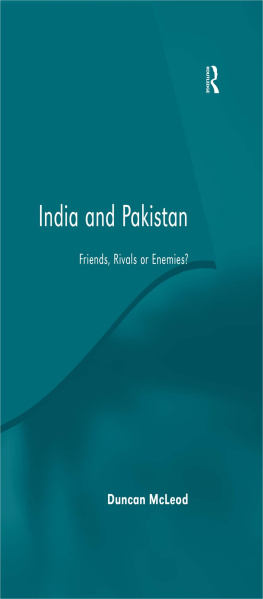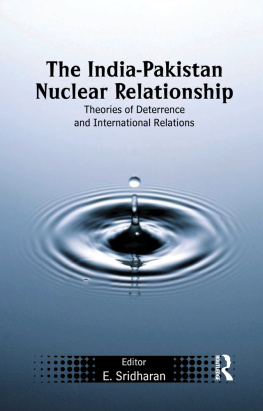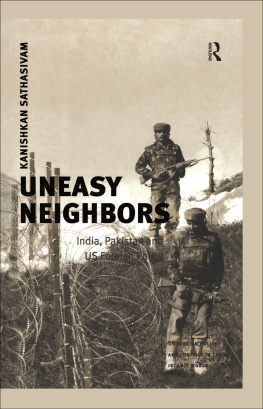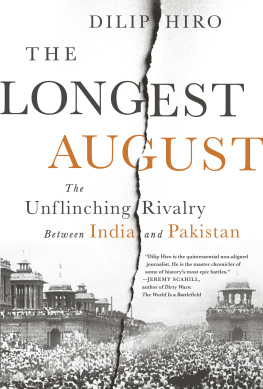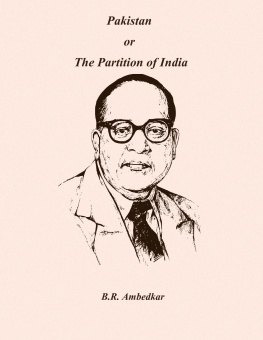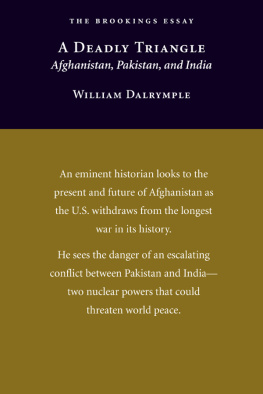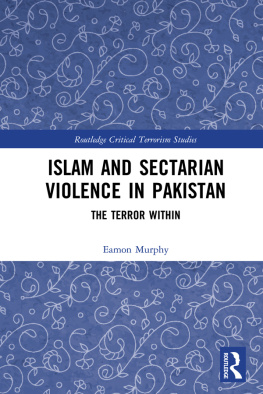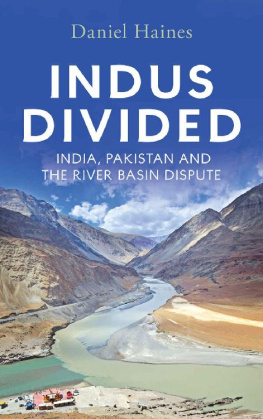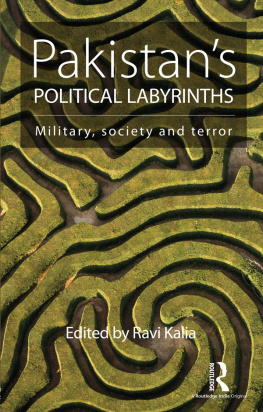INDIA AND PAKISTAN
To the memory of my dear old mum
Annie Marilyn Moore
19352007
First published 2008 by Ashgate Publishing
Published 2016 by Routledge
2 Park Square, Milton Park, Abingdon, Oxon OX14 4RN
711 Third Avenue, New York, NY 10017, USA
Routledge is an imprint of the Taylor & Francis Group, an informa business
Copyright Duncan McLeod 2008
Duncan McLeod has asserted his moral right under the Copyright, Designs and Patents Act, 1988, to be identified as the author of this work.
All rights reserved. No part of this book may be reprinted or reproduced or utilised in any form or by any electronic, mechanical, or other means, now known or hereafter invented, including photocopying and recording, or in any information storage or retrieval system, without permission in writing from the publishers.
Notice:
Product or corporate names may be trademarks or registered trademarks, and are used only for identification and explanation without intent to infringe.
British Library Cataloguing in Publication Data
McLeod, Duncan
India and Pakistan : friends, rivals or enemies?
1. India - Relations - Pakistan 2. Pakistan - Relations - India
I. Title
327.5405491
Library of Congress Cataloging-in-Publication Data
McLeod, Duncan.
India and Pakistan : friends, rivals or enemies? / by Duncan McLeod.
p. cm.
Includes bibliographical references and index.
ISBN 978-0-7546-7437-5
1. India--Relations--Pakistan. 2. Pakistan--Relations--India. 3. India--Politics and
government. 4. Pakistan--Politics and government. I. Title.
DS450.P18M46 2008
303.4825405491--dc22 2008028410
ISBN: 978-1-3519-2809-0 (ebk)
Contents
I would like to express my thanks and gratitude to Dr Vernon Hewitt who assisted me greatly in my attempts to carve out a theoretical framework for this study. It was the most arduous task of this study but also (with hindsight) the most interesting. In the earliest drafts of the first chapter, sharing a mutual interest in all things horticultural with Dr Hewitt provided a picturesque backdrop to the delicate and often contradictory nature of the politics of British India and the Princely states as we trod gently through the floriculture of South Bristol. I would also like to thank the South Asian mafia in exile, Arnab Ray Chaudhuri and Dr Mazhar Aziz who gave me a particular insight into Punjabi Bengali relations and also Arnabs parents Mr Alak Ray Chaudhuri and Mrs Maya Chaudhuri for making me so welcome in their home at Calcutta.
The map for this work has been drawn by my friend and fellow Aberystwyth graduate, Sally Williams, unfortunately her attempts to teach me Welsh did not reach the same heights as her abilities as an artist, nonetheless, diolch yn fawr.
I would also like to mention the staff at the Indian Institute at Oxford, it is always refreshing to visit the Institute and be greeted by their enthusiasm and advice. To allow for the furtherance of knowledge and debate librarians and archivists have to succumb to the loathsome task of allowing readers access to their priceless contents an irksome undertaking but one achieved with great skill at Oxford.
As for home I would like to thank Anne, Dylan and Dougal who kept everything in perspective and in particular Dylan who fastidiously avoided nibbling any electrical wires connected to the word processing of this study.
Yes, I think we may say everythings more or less oojah-cum-spiff. With one exception, Jeeves, I said, a graver note coming into my voice as I gave Gus his second helping of kipper. There remains a fly in the ointment, a familiar saying meaning well, I dont quite know what it means. It seems to imply a state of affairs at which one is supposed to look askance, but why I ask myself, shouldnt flies be in ointment? What harm do they do? And who wants ointment anyway?
P.G. Wodehouse
Chapter 1
Introduction
Since the independence and partition of India and Pakistan in 1947 the relationship between these two states has been the most intractable and the most dangerous political stand off in South Asia. Since the end of the Cold War, it is perhaps the most dangerous and unpredictable region in international politics. In a meeting between President Clinton and the incoming President Bush, Clinton advised Bush that the, continuing tension between India and Pakistan, should be high on the incoming administrations list of priorities, because they both have nuclear weapons (Clinton 2004). There are several reasons for this continuing tension, first, the hostility between the Indian National Congress (INC) and the Muslim League prior to independence, hostility that carried over into the post-1947 period. Second, the bloodletting that occurred at partition, served even further to entrench hostility between them, leading both to question the justification and legitimacy of each other. Third, within weeks of independence Kashmir became and remains a continued source of political, ideological and military friction between them.
The theoretical framework (outlined on ) is grounded in Alexander Wendts materialist/ideationalist constructivist approach and uses Wendts characterization of the three cultures of anarchy. They are: a Kantian culture of anarchy given meaning through the logic of friendship; a Lockean culture of anarchy given meaning through the logic of rivalry; lastly, a Hobbesian culture of anarchy given meaning through the logic of enmity.
From a South Asian security perspective, the book will apply these three cultures of anarchy to Indo-Pakistan relations to account for changes in their relationship and to offer a theoretically informed judgment as to the direction the relationship is heading. Theoretically the book will demonstrate that looking at ideas and intersubjectivity at the micro level gives us new insight into the dynamics of India Pakistan relations that a purely structural approach is not able to do.
The hypothesis of this book is that there is a transitory nature in anarchy between India and Pakistan and through the three cultures of anarchy we can see these transformations that hitherto structural attempts to theorize Indo-Pakistan relations have been unable to accommodate or account for.
The argument of the book is that this transient relationship has moved away from a Kantian culture of anarchy prior to colonialism, to a post-1947, Lockean culture that fluctuated towards a Hobbesian culture of anarchy in 1971. Given that both states are now nuclear weapon states, fluctuation between these cultures could have catastrophic results for South Asia.
Constitutionally Pakistan is a Muslim state created as a home for the Muslims of South Asia. India by contrast is a federated secular state brought into being by the union of what was the British Raj and the Princely states that has left Indo-Pakistan relations replete with political, secular, religious and constitutional antagonisms. Barry Buzan suggests, their historical, geographic and cultural ties do not allow them to ignore each other. but their organisation principles pose a permanent threat to each other (Barry Buzan 1983, 78).
This study will look at how these historical, geographic and cultural ties have contributed to the transitory character of anarchy between India and Pakistan and examine just how permanent a threat India and Pakistan are to each other and how this threat can be theorized and understood more clearly.

